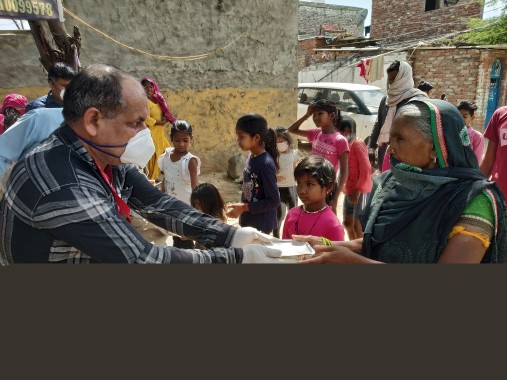A firsthand account: the battle against coronavirus in India
Dr Imtiaz Ahmed is the Mission Head at Agecare and earlier this month he joined our network partners HelpAge India to distribute food in a densely populated and extremely modest area often referred to as 'Rangpur Pahari slum' in New Delhi.
Here he gives us his eyewitness experience of the distribution as many families already on the brink of deepening poverty experience a nationwide lockdown.

As we took a sharp turn from the main road off Vasant Kunj, amidst the dust storm kicked up by our mobile medical unit on the Kutcha road, we could see a temporary hutment and settlement amidst the sea of filth and refuge surrounding it.
As we were reaching the first distribution point, we saw a similar dust storm rising in the not so far horizon, equally ferocious and riveting. Before we could make out what the the reason behind the storm was, we saw a large crowd of children running behind our vehicle and shouting at the hutment along the kutcha road and informing,“Jaldi Aao, Khaane ki Gaadi Aa gayee” ,"Come fast, the food distribution vehicle is here."
Pretty soon we had a big crowd of mothers with young infants in their hands, children towing behind, elderly and, for a moment, it seemed the entire slum settlement was upon us.
India declared its war against Covid-19 with the directive of a nationwide lockdown for 21 days on 24th March 2020.
The sudden lockdown proved to be a massive blow to the 450 million people who work as informal sector workers (workers in the informal industry include daily wage labourers and construction workers) as they soon found themselves jobless, stripped of their livelihood and with nowhere to go. Without any job or livelihood, these people had only one option to fall back on – go back to their villages from where they came from. However, with the shutdown of transportation and sealing of interstate borders, many had to walk hundreds of miles to reach their home in what is termed as the biggest mass migration since the country’s independence. Many were stopped at the border and had to come back to their homes in the slums. With no money and food provisions rapidly depleting for families in the slums, it is now an every day battle for survival.
In this battle the elderly are the ones who are getting left behind and ignored.
As the crowd gathered around our vehicle clamouring for food, it was a herculean task to ask people to follow social distancing, as hunger outweighed a sense of safety for self and family. I looked worryingly at Manoj, our Mobile Health Unit Social Protection Officer. Manoj smiled and told me not to worry. From nowhere a few local volunteers appeared and asked the crowd to make a row “with one hand distance between each other”.
Before starting distribution, we scanned for older people in the crowd. We fast-tracked these people to receive food packets first as it was very hot and would been detrimental to the health of these individuals to wait. We then started food distribution to the wider group and tales of human suffering, hardships and difficult prioritisation came to the fore. Mothers, wiping their tears, told heart-rending stories of how they and their husbands with the elderly of the house were going hungry to feed their children from the limited food distribution that is currently in process.
While I was talking to the mothers, I felt a soft tug on my leg. Looking down, I saw a young malnourished child, telling me in broken sentences and in between stutters, “Saab, aur chaar packet de do na… Ghar mein aur log hein," "Sir, give me four more packets please, as there are four other family members who need to eat."
We completed the first site and started for the second.
A similar dust storm with children running and shouting followed, at the end of which we once again saw a massive gathering to receive food packets. Continuing my interaction with the community, I met Maya Devi. She has a household of six consisting of husband, two children and elderly in-laws, all staying in a small hutment. Her query was simple and heart wrenching, “Saab, aap log toh lunch de ke chale jaaoge, par dinner ka kya? kal ka kya? Hum apne family ko kaise khilayein aur hum kya karein?” "Sir you will give lunch for today and go. But what about dinner today? What about food for tomorrow? What should we do to feed our family? Tell us what do we do?"
I did not have answer to her query as I tried to look away from the large kohl lined inquisitive eyes now fast filling with tears.
As we rode back, I reflected on the humbling experience of my day, my role as a developmental professional, and what is it that we can do to mitigate this human tragedy as echoes of Maya Devi’s question reverberated in my ear, "Hum apne family ko kaise khilayein aur hum kya karein?” "What should we do to feed our family? Tell us what do we do?"
I still don’t have an answer.
 Follow us on social media
Follow us on social media
Keep seeing our stories or ask us a question - connect on Facebook and LinkedIn.
Read more stories from the ground
Read more of the latest news and stories on our work in combating the coronavirus in low to middle income countries.
Help us to continue supporting older people around the world
Whether with better healthcare, a secure income or life-saving aid – your gift could help change lives.
